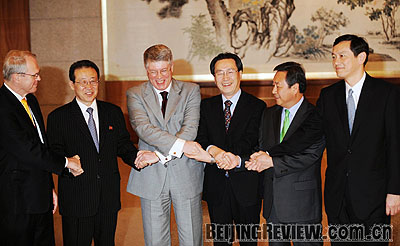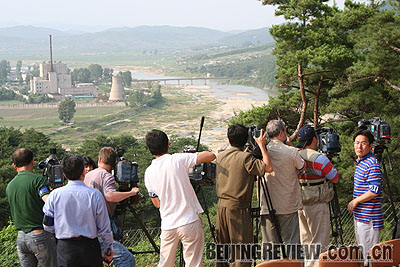
REACHING CONSENSUS: Heads of delegations at the six-party talks hold hands before their meeting on July 10 in Beijing
The tense situation surrounding denuclearization on the Korean Peninsula has reached a turning point. On October 11, U.S. Secretary of State Condoleezza Rice formally signed a document removing North Korea from the list of state sponsors of terrorism. In response, North Korea said it would continue to disable its nuclear facilities and permit the international community to supervise and validate the process.
Experts on international affairs say the U.S. action has put denuclearization and the U.S.-North Korean relationship back on the right track. But they also caution that there is still a long way to go before denuclearization is fully realized and the two countries resume normal diplomatic relations.
A twisted process
The two countries have clashed since the Korean War in the 1950s. In 1988, U.S. President Ronald Reagan listed North Korea as a state sponsor of terrorism. In his 2002 State of the Union speech, U.S. President George W. Bush named North Korea, along with Iraq and Iran, as the three "axis of evil" states threatening world peace.
By designating North Korea as a state sponsor of terrorism, the United States not only put North Korea under political pressure, but also imposed strict restrictions on its exports and eligibility for foreign aid. Therefore, winning removal from the list was North Korea's top priority in ameliorating its relationship with Washington, said Xu Baokang, a senior commentator on international affairs, in an article in People's Daily on October 14.
Tensions between the two countries have eased since August 2003, when China, South Korea, North Korea, the United States, Japan and Russia held the first round of six-party talks aimed at resolving the nuclear issue.
In accordance with the second-phase actions announced on October 3, 2007, for the implementation of the September 2005 Joint Statement, North Korea began to disable its three nuclear facilities at Yongbyon in November 2007. On June 26 this year, North Korea submitted a declaration on its nuclear programs to China, the chair state of the six-party talks, and blew up the nuclear reactor cooling tower at Yongbyon two days later. But the United States failed to follow through on its promises to remove North Korea from the blacklist and abolish sanctions like the Trading with the Enemy Act, instead suggesting the six countries set up a validation mechanism to monitor the disablement process. North Korea accused the United States of breaking its promise and violating the "words for words, action for action" principle agreed upon in the September 2005 Joint Statement. On August 26 this year, North Korea suspended its nuclear disablement, and on September 19 announced it would restart the nuclear reactor at Yongbyon. The nuclear issue had stagnated once again.
 PHOTO OP: Journalists and photographers wait for the historic moment when North Korea exploded its nuclear reactor cooling tower at Yongbyon on June 28
PHOTO OP: Journalists and photographers wait for the historic moment when North Korea exploded its nuclear reactor cooling tower at Yongbyon on June 28
In early October, the United States sent envoys to Pyongyang, where the two sides reached a consensus: The United States would remove North Korea from the blacklist without precondition, while North Korea would resume nuclear disablement and accept nuclear inspectors.
These developments have broken the stalemate in the six-party talks and guaranteed future progress. "The newly reached consensus is a positive sign," Xu said in the People's Daily report.
The United States suddenly conceded, Xu said, because Bush is approaching the end of his term. "He didn't want his diplomatic efforts on the nuclear issue to be in vain, hence he finally made a policy adjustment," Xu said.
Xu mapped out what might come next: Once the United States removes North Korea from the blacklist and lifts economic sanctions, North Korea will seek foreign trade, investment and
